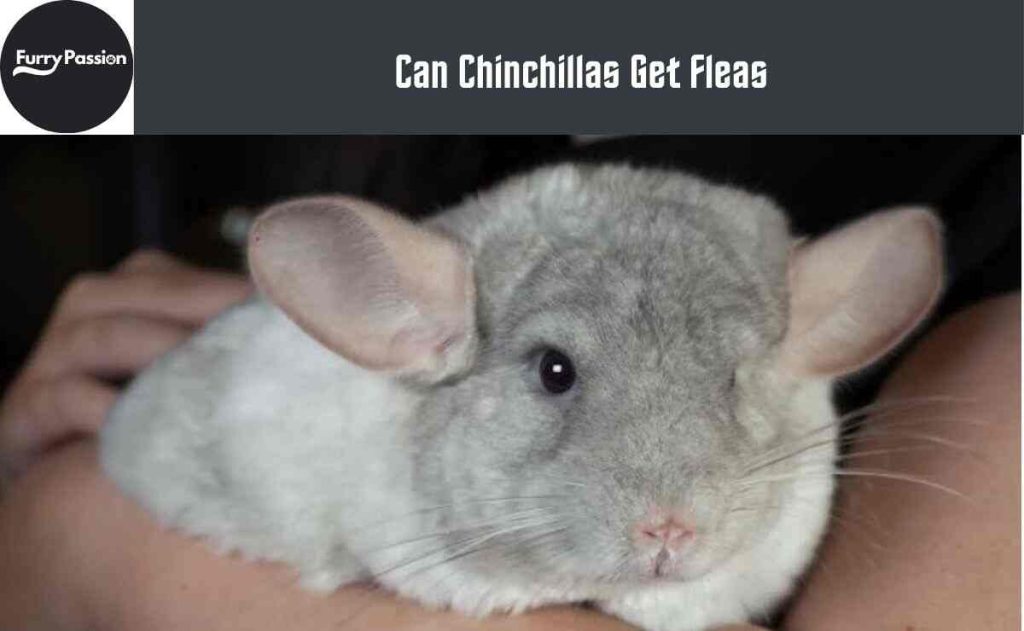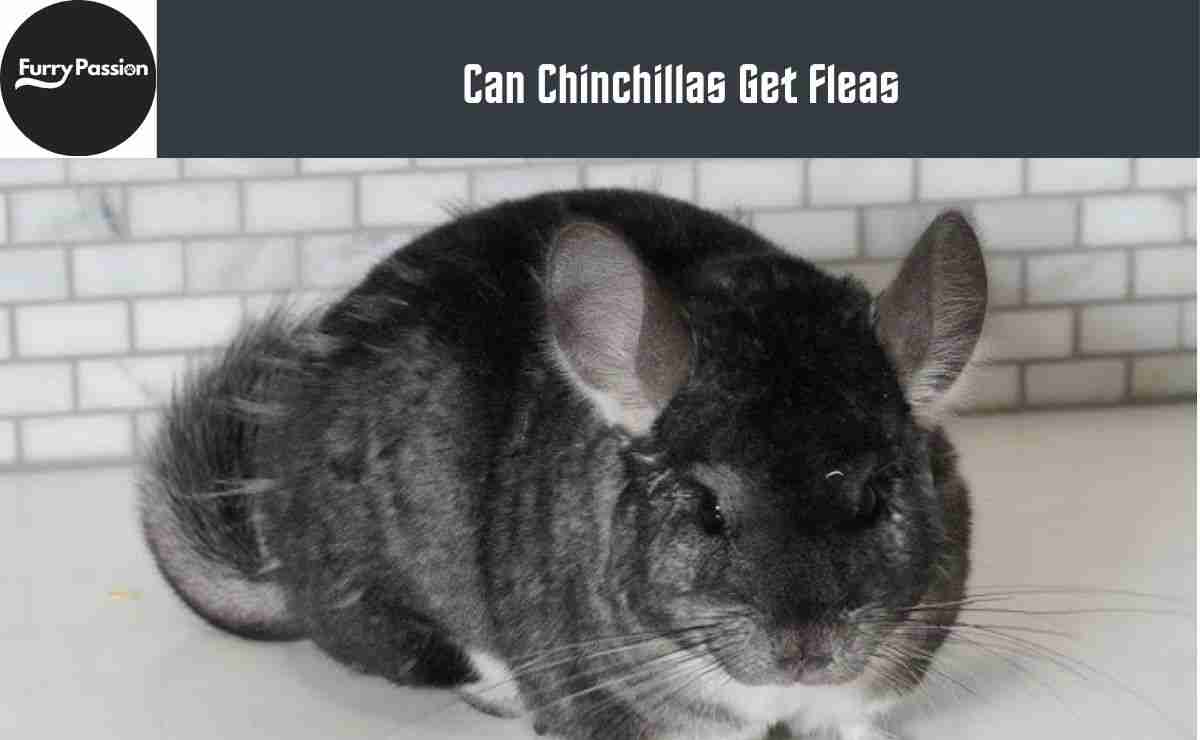Fleas are a common concern for pet owners, but can chinchillas get fleas?
Cats and dogs are more commonly infested with fleas. But it is possible for chinchillas also to get fleas. It is relatively rare for chinchillas. Still, these blood-sucking insects don’t spare any furry living creatures.
Fleas are harmful to chinchillas. They can cause irritation and hair loss. It is important to regularly check chinchillas for fleas and give proper treatment if necessary.
Can Chinchillas Get Fleas?

Chinchillas are native to the Andes Mountains in South America, where they live in dry and cool environments. On the other hand, fleas thrive in warm and humid conditions. So it is less likely for chinchillas to encounter them in their natural habitat.
However, if you keep a chinchilla in a household, then they are more likely to be infected with fleas. The spreading capability of fleas is too high. If there are other pets with fleas nearby, there is a high chance that the fleas can transfer to your chinchilla.
It’s a misconception that chinchillas don’t get fleas as they have dense fur. But it is not fully true. Though it is rare, chinchillas can indeed get fleas. Their thick fur acts as a natural deterrent, making it challenging for fleas to infest and thrive.
So chinchilla’s thick fur is like a blessing. Further, the insanely soft fur makes them truly adorable. This fur keeps them warm and protects them, but there is a drawback.
It’s true that fleas have difficulties infesting in chinchilla’s fur. But once they get in, it is quite tough to spot the fleas. So spotting fleas on a chinchilla needs careful observation and tact.
How Do Chinchillas Get Fleas?
Fleas are tiny, wingless insects that feed on the blood of animals. In the case of chinchillas, fleas can pose a significant health risk.
There are several ways that these pesky parasites can infest a chinchilla’s fur. One common way is through contact with other animals that already have fleas. If a chinchilla comes into close proximity to an infested animal, the fleas can easily transfer from one fur coat to another.
Another way chinchillas can get fleas is through exposure to contaminated environments. Fleas can survive in various environments, such as grassy areas or bedding material, and can easily hitch a ride on a chinchilla as it moves through these spaces.
Abandoned bird nests, especially those in proximity to your chinchilla’s living space, can harbor fleas. Chinchillas may pick up fleas when exploring or being curious about these nests.
Fleas can thrive in upholstery, carpets, and furniture. If these items are infested, chinchillas might come in contact with fleas present in their environment.
Chinchillas can also acquire fleas from humans. If a person has been in contact with fleas, either through their own pets or infested areas, they can unknowingly transfer the fleas to a chinchilla through direct physical contact.
How To Tell If Your Chinchilla Has Fleas?
Finding fleas from chinchilla’s dense fur is quite challenging. However, several straightforward signs can help you identify if your pet is dealing with these pesky pests.
- Keep an eye out for tiny specks on your chinchilla’s fur, resembling dirt. This is often the excrement of fleas and looks like dried blood. You can use a brush gently on their fur. Then examine the brush for any unusual debris. This method helps in flea detection.
- Fleas cause skin irritation. Your chinchilla can start excessive scratching and biting. Sometimes, itchiness may be a result of dust baths rather than fleas. Dust baths, while beneficial for chinchillas, can occasionally lead to heightened irritation.
- Increased aggression and noticeable discomfort are indicators that your pet might be dealing with these tiny intruders. When observing these signs, it’s essential to distinguish between genuine flea concerns and regular chinchilla behaviors.
- Excessive blood-sucking by fleas can lead to hair loss in chinchillas. If you observe patches of missing fur, it could be a sign of a flea infestation.
What Are Flea Treatments For Chinchillas?
Since fleas are common infections in cats and dogs, so you will get easily medications for them. But when it comes to chinchillas, they rarely encounter fleas, making preventative medication uncommon for them.
Avoid using flea treatments purchased from drug stores without professional advice. These medications may be suitable for other pets but can pose serious risks to chinchillas, considering their small size.
Steer clear of flea collars, despite their popularity. These collars, while effective for larger pets, can be poisonous to chinchillas. The small size of chinchillas makes them more susceptible to the adverse effects of such products.
So if your chinchilla gets fleas, exercise caution before taking any action due to their small size. If you suspect that your chinchilla has fleas, it is important to take action promptly. Fleas can cause discomfort and irritation to your chinchilla and can also transmit diseases. Here are some steps you can take if you suspect your chinchilla has fleas:
- Isolate your chinchilla
It’s the first and utmost step. If you have other pets in your household, separate your chinchilla from them to prevent the fleas from spreading.
- Consult Your Vet
Never administer flea medication or attempt to use over-the-counter remedies, such as flea collars, without consulting your veterinarian. Chinchillas are delicate animals, and improper treatments can potentially harm or even be fatal to them.
Always rely on professional advice and prescribed medications. Offer prescribed medications tailored to chinchillas. Common prescriptions include ivermectin or selamectin, proven effective against fleas and parasites.
- Regular Vet Check-ups
Schedule regular veterinary check-ups to monitor your chinchilla’s health and address any potential issues promptly.
- Proper Dosages
Provide the correct dosage of prescribed medications to your chinchilla. If you don’t follow the right way, fleas will come back again. So it is necessary to provide accurate dosages based on your pet’s specific needs.
- Maintain Cleanliness of the environment
Thoroughly clean your chinchilla’s cage and surrounding area to eliminate any potential flea eggs or larvae. Vacuuming the area can help in removing any fleas that may have fallen off your chinchilla.
How To Prevent Fleas?
Preventing flea infestation in chinchillas requires a proactive and thorough approach. Though chinchillas are rarely infested with fleas, still you should take preventative measures for your pets.
- Clean Environment: First and foremost, maintaining good hygiene for your chinchilla is crucial. Regularly clean and sanitize their habitat, including their cage, toys, and bedding. Vacuuming the surrounding area and removing any debris or dirt can also help prevent fleas from taking residence.
- Grooming: Another key step is to regularly groom your chinchilla. Frequent brushing will not only keep their fur clean and healthy, but it will also help you detect any signs of fleas or other parasites.
- Observing: Inspect their fur thoroughly, paying close attention to areas like the neck, tail, and behind the ears, as these are common hiding spots for fleas. If you spot any signs of fleas, such as tiny black dots or excessive scratching, take immediate action.
- Treat Other Pets: Ensure that your chinchilla’s living environment is flea-free. This includes treating any other pets in your household for fleas and regularly checking for signs of infestation. All animals in your household should be treated for fleas, as fleas can be easily transmitted from one to another.
- Use Safe Products: Consider using preventive products specifically designed for chinchillas. There are flea prevention sprays and treatments available that are safe for chinchillas, but be sure to consult with a veterinarian before using any products.
- Hygiene the Cage: Lastly, it is essential to maintain a clean and pest-free cage for your chinchilla. You should regularly clean their living space, remove any potential sources of infestation, and keep the surrounding area well-maintained. Also, wash their bedding and ensure proper ventilation to keep the environment dry and inhospitable to fleas.
Conclusion
Chinchillas can get fleas but it’s not common. Their dense fur protects them from fleas. Yet, you should take necessary precautions to ensure fleas keep away from your chinchilla.
Regular veterinary check-ups and proper hygiene practices can help prevent flea infestations in your chinchilla.
